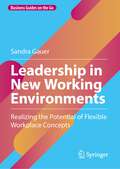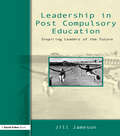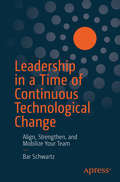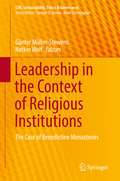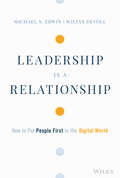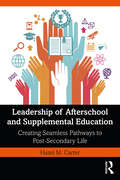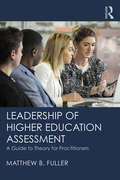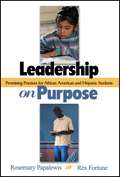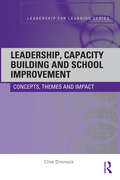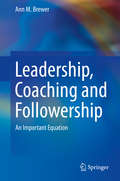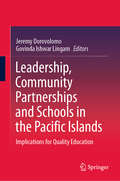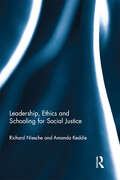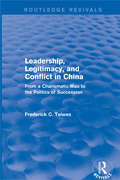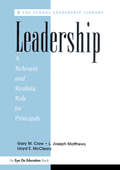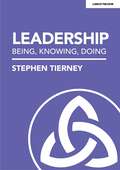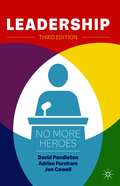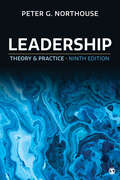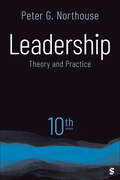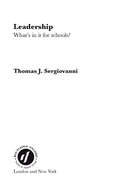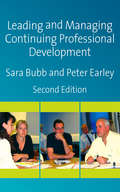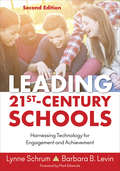- Table View
- List View
Leadership in New Working Environments: Realizing the Potential of Flexible Workplace Concepts (Business Guides on the Go)
by Sandra GauerThis book discusses the challenges that modern and flexible workplace concepts pose for managers. In particular, it addresses the uncertainties and stress factors that employees face when working in multi-space environments and how they become attached to their workplace. Drawing on a hybrid methodological approach that combines a literature review with practical lessons learned as a workplace change consultant, it offers managers concrete advice on how to lead in multi-space environments. This book aims to reduce the uncertainties and stressors caused by new work environments, and ideally to transform them into growth opportunities for the entire company. Providing concrete solutions, it represents a valuable asset for managers, HR professionals, and workplace initiative leaders alike.
Leadership in Post-Compulsory Education: Inspiring Leaders of the Future
by Jill JamesonLeadership of different kinds exists at many levels in the post-compulsory sector-from principles to programme leaders, administrative staff and even caretakers. Based around case studies of current leaders in post-compulsory education, this unique book explores a number of leadership models and styles in order to provide inspiration and guidance for the next wave of potential leaders. * Captures authentic "voices of the leaders" * Includes examples of further, adult, community and prison education * Covers all type of leadership: charismatic leaders, academic leaders, spiritual leaders, women leaders, ethnic leaders, ethnic leaders, business leaders Presenting a wide and holistic view of leadership at different levels, this book is relevant for all potential and current leaders in post-compulsory education. By encouraging readers to review and reflect on the models described, the book will inspire leaders of the future to develop their own leadership styles and visions.
Leadership in a Time of Continuous Technological Change: Align, Strengthen, and Mobilize Your Team
by Bar SchwartzDigital technology is rapidly challenging the way we do business, interact with our communities, and learn about the world. Due to this, leading change in your digital organization now comes with unprecedented tools and platforms to make your teams the most effective they can be. Leadership in a Time of Continuous Technological Change has arrived at this pivotal moment and is your roadmap for this exciting, evolving journey. Author Bar Schwartz introduces a holistic framework for leaders to take the reins in the digital Wild West. Achieving your team’s goals in this new environment will require high creativity, an entrepreneurial mindset, and a diversity of perspectives to solve problems that have never before been tackled. Roles and responsibilities have morphed, and what made you successful in the past may no longer apply. Leadership in a Time of Continuous Technological Change is an unmatched resource fit for our new decade. Through analyzing detailed case studies, you will see how understanding your identity paves the way to achieving emancipation, capability, and autonomy. Ultimately, you will be empowered to lead with clarity. Your team has everything they need to excel. Discover how alignment and clarity can support you in launching your team to new heights.What You Will LearnExamine case studies of different situations that can arise within a team and go through lists of takeaway questions that leaders can start asking to gain quick winsAdopt an agile mindset while taking into consideration the existing culture in the organizationCommunicate and align on expectations and goals with your team in a time of organizational change Who This Book Is ForEmerging leaders who are dealing with change or leading change and seek to increase the level of alignment and clarity for their people and themselves
Leadership in the Context of Religious Institutions: The Case of Benedictine Monasteries (CSR, Sustainability, Ethics & Governance)
by Günter Müller-Stewens Notker WolfThis book explores opportunities and limitations with regard to transferring knowledge and tools from the corporate world to manage monasteries or other types of religious institutions. To do so, the contributing authors analyze both the ideological and practical implications of employing modern organizational theory in the context of religious institutions, and seek to strike a balance between preserving traditions and promoting modernization. In this regard, they draw on experience gained in the course of long-standing collaborations between religious institutions, such as monasteries, and business and management schools.
Leadership is a Relationship: How to Put People First in the Digital World
by Michael S. Erwin Willys DeVollDiscover how putting people first creates vibrant organizations and profound change In Leadership is a Relationship, accomplished founders and authors Michael S. Erwin and Willys DeVoll deliver an insightful collection of interviews with leaders who have succeeded by prioritizing the wellbeing of other people. Featuring fresh stories from leaders like Olympic legend Kerri Walsh Jennings, former Secretary of Veterans Affairs Bob McDonald, and visionary principal Dr. Virginia Hill, the book shows how you too can become a relationship-based leader and thrive in our chaotic, digital world. By highlighting role models from different careers, backgrounds, skill sets, and schools of thought, the authors offer readers an inspiring antidote to one of the most serious—and underreported—crises of our era: the damage that digital distractions have done to our personal relationships. The book offers: Concrete strategies for combating the depersonalization of the Information Age and strengthening our connections with other people Real stories of how people from Olympic champions to small-business owners have put people first Take-away tips for the busy reader who needs quick insight or hopes to use the book in a modular curriculum for their organization or class Perfect for anyone who wants lead both morally and effectively, Leadership is a Relationship provides a concise and convincing argument that leaders who put people first have the best chance of succeeding in the twenty-first century.
Leadership of Afterschool and Supplemental Education: Creating Seamless Pathways to Post-Secondary Life
by Hazel M. CarterThis book explores the design and implementation of effective supplementary education programs that best prepare students for post-secondary life. Drawing from research and best practice in the fields of supplementary and afterschool education, youth development, and school–college–community partnerships, this book outlines a balanced approach to viewing supplementary education and community-based programs, which when designed alongside classroom learning, can meet the needs of underserved youth. This book challenges aspiring educational leaders to confront the traditional approach to curriculum as the sole purview of the classroom and instead positions supplementary education as a tool to improve schools and student success. Chapters discuss designing, implementing, and sustaining supplementary education programs that positively impact the social, emotional, and academic development of secondary school students, as well as effective strategies for developing stronger connections with the community. This text is designed for use in graduate preparation programs in educational leadership and includes pedagogical features such as learning objectives, reflective exercises, portfolio-building activities, and alignment to educational leadership standards.
Leadership of Higher Education Assessment: A Guide to Theory for Practitioners
by Matthew B. FullerLeadership of Higher Education Assessment provides a comprehensive treatment of leadership theories and helps practitioners integrate this knowledge into their assessment work. Synthesizing leadership theories into manageable concepts relevant to the college and university context, this useful guide supports assessment leaders in addressing complex institutional situations and developing their own unique philosophy of assessment and leadership style. In the face of ongoing challenges such as data accessibility, data security concerns, a shifting accreditation environment, complex politics, and lack of available resources, this book is a critical guide for assessment leaders who want to take command of their practice.
Leadership on Purpose: Promising Practices for African American and Hispanic Students
by Dr Rosemary Papa Dr Rex FortuneThis invaluable resource highlights specific best practices from 13 exemplary schools that yield high achievement for ethnically diverse students.
Leadership, Capacity Building and School Improvement: Concepts, themes and impact (Leadership for Learning Series)
by Clive DimmockLeadership, Capacity Building and School Improvement provides a fresh and original perspective on the most important issues confronting today’s practitioners and academics in the field of educational leadership. New and exciting concepts are introduced such as the research-engaged school of the future. While its theoretical and evidence-based approach raises to a robust level the discussion on the most important leadership challenges of the day, the book is at the same time intensely practical in addressing everyday issues faced by contemporary policy makers and school practitioners. Underpinning the eleven chapters is a conceptual framework founded on the notion of leadership as capacity building, giving the book a coherence that many others on school leadership lack. Among the themes actively discussed are: Conceptualising and Contextualising Leadership – what is leadership? What distinguishes good from mediocre and poor leaders? What are the traits, dispositions and attributes that make for good leadership? How does context influence leadership? How appealing is leadership as a career? What are the components of capacity building leadership? Contemporary Leadership Themes – what is learning-centred leadership and how can it best promote good teaching and student learning? How can leaders distribute leadership across the school, and what are the pitfalls? How can leaders capitalise on the notion of the school as a professional learning community? How can leaders best be nurtured and developed? Policy, Leadership Practice and Impact – what new forms of leadership are presaged by the specialist schools policy as a means of school improvement? How can schools combine a focus on academic achievement with the need to prepare students for the changing twenty-first century workplace? Leadership, Capacity Building and School Improvement provides an up-to-date authoritative, critical and insightful account of school leadership. It combines advocacy and argument with evidence-based practice drawn from the most plausible and robust sources. This book will prove a valuable tool for those taking higher degrees in school leadership and management: school leaders on NPQH courses and school practitioners as a whole interested in interfacing with the latest empirical evidence and ideas, as well as academics teaching and researching in the area of educational leadership. Since the book adopts an international perspective, drawing its examples and evidence from both the Anglo-American and the Asian contexts, it will be found relevant to academics, policy makers and practitioners across these regions. Clive Dimmock is Visiting Professor at the National Institute of Education in Singapore and Professor Emeritus at the University of Leicester, UK.
Leadership, Coaching and Followership
by Ann M. BrewerThis volume presents evidence-based ideas on all three converging forces to suit an array of individuals and their organisations. The volume is thick with evidence, detail and case studies that the reader can draw upon and apply to their own situations. Defining exactly what is leadership has been a persistent problem for researchers and theorists. Discovering how to create or produce leaders likewise has been a difficult challenge over the years. Written by an academic, executive and coach, the author focuses on three important converging aspects: leadership, followership and coaching. Focus on leaders is disproportionate to what actually occurs within most organisations especially the relationship between the leader and the followers. That leadership is tantamount with being in control of a situation is challenged, together with the belief that leadership capability is primarily shaped in line with a set of success criteria. The coach plays a significant part in this process although rarely visible.
Leadership, Community Partnerships and Schools in the Pacific Islands: Implications for Quality Education
by Jeremy Dorovolomo Govinda Ishwar LingamThis book explores a range of educational issues in the Pacific Islands, from school leadership in various contexts to the importance of forging cordial school and community partnerships. By presenting perspectives from a wide range of stakeholders, including community leaders, teachers, parents and students, it adds to the ongoing dialogue on educational issues in the Pacific Islands. Moreover, it promotes the forging of healthy school ecosystems that value equality, diversity, community engagement, fruitful citizenship, proactive school leadership, and valuable student learning, to drive an educated Pacific Islands population into the future.
Leadership, Ethics and Schooling for Social Justice
by Richard Niesche Amanda KeddieIssues of social justice and equity in the field of educational leadership have become more salient in recent years. The unprecedented diversity, uncertainty and rapid social change of the contemporary global era are generating new and unfamiliar equity questions and challenges for schools and their leaders. In order to understand the moral and ethical complexity of work undertaken in the name of social justice and equity in diverse contexts, this book uses a range of different theoretical tools from the work of Michel Foucault. Rather than a prescriptive, best practice approach to leadership and social justice, this book draws on Foucault’s four-fold ethical framework, and specifically, the notions of advocacy, truth-telling and counter-conduct to critically examine the leadership work undertaken in case studies in schools in Australia and England. Our approach makes transparent the ethical work that leaders in these contexts conduct on themselves towards creating schools that can address the equity challenges of the present climate. It illuminates and enables critical analysis of the moral imperatives shaping the equity work of school leaders and, in particular, the possibilities for transformative leadership that can work to create schools and school systems that are more socially just. Overall, the book’s key aims are to: Provide an innovative and comprehensive theorising of leadership for social justice in contemporary times; Explicate the utility of key elements of Foucault’s theorising of the ethical self to the domain of educational leadership; and Provide significant practical insight into the social justice possibilities of school leadership in contemporary times through two in depth case studies
Leadership, Legitimacy, and Conflict in China: From a Charismatic Mao to the Politics of Succession (Routledge Revivals)
by Frederick C TeiwesThis title was first published in 1984: This text provides a source of citations to North American scholarships relating specifically to the area of Eastern Europe and the former Soviet Union. It indexes fields of scholarship such as the humanities, arts, technology and life sciences and all kinds of scholarship such as PhDs.
Leadership: A Relevant and Realistic Role for Principals
by Gary M. Crow Lloyd E. Mc Cleary L. Joseph MatthewsWith case studies on such topics as implementing a technology program and modifying a schedule, this book shows why principals must play a leadership role.
Leadership: Being, Knowing, Doing
by Stephen TierneyIn an increasingly frenetic world too many leaders have lost sight of the simple yet profound wisdom associated with practical action, otherwise known as phronesis. Phronesis is an ancient Greek word associated with good judgement and good character. At its core, it is about the ability to discern how best to act. Practical wisdom involves acting thoughtfully and virtuously and encouraging others to do the same. Stephen Tierney describes virtue, thought and action – which coalesce in effective leadership – as the Way of Being, Way of Knowing and Way of Doing. Each of the three Ways consist of a number of elements termed the Basics. The Ways of Being: Purpose & Introspection The Ways of Knowing: Specialism & Strategy The Ways of Doing: Implementation, Networking, Guardianship & Expertise Structuring the book around these eight Basics, readers will be challenged and supported to explore each of the Basics from a theoretical perspective and then provided with real world examples of how they were applied by Stephen in his own career in educational leadership. In writing Leadership: Being, Knowing, Doing, Stephen seeks to help leaders explore their own capabilities and potential. Leadership can be learnt. The three Ways with their constituent Basics represent a mirror to help leaders reflect upon and improve their practice. In turn, current leaders are called upon to accept the responsibility to grow the leaders of the future.
Leadership: Being, Knowing, Doing
by Stephen TierneyIn an increasingly frenetic world too many leaders have lost sight of the simple yet profound wisdom associated with practical action, otherwise known as phronesis. Phronesis is an ancient Greek word associated with good judgement and good character. At its core, it is about the ability to discern how best to act. Practical wisdom involves acting thoughtfully and virtuously and encouraging others to do the same. Stephen Tierney describes virtue, thought and action – which coalesce in effective leadership – as the Way of Being, Way of Knowing and Way of Doing. Each of the three Ways consist of a number of elements termed the Basics. The Ways of Being: Purpose & Introspection The Ways of Knowing: Specialism & Strategy The Ways of Doing: Implementation, Networking, Guardianship & Expertise Structuring the book around these eight Basics, readers will be challenged and supported to explore each of the Basics from a theoretical perspective and then provided with real world examples of how they were applied by Stephen in his own career in educational leadership. In writing Leadership: Being, Knowing, Doing, Stephen seeks to help leaders explore their own capabilities and potential. Leadership can be learnt. The three Ways with their constituent Basics represent a mirror to help leaders reflect upon and improve their practice. In turn, current leaders are called upon to accept the responsibility to grow the leaders of the future.
Leadership: No More Heroes
by David Pendleton Adrian F. Furnham Jonathan CowellLeadership is most needed in times of change, uncertainty and crisis. We are living through those times. To support leaders in all spheres, this book provides a guide to the territory of leadership and its three domains: the strategic (head), the operational (hands) and the interpersonal (heart). It describes the tasks leaders have to achieve and explains the psychology of leadership based in personality. It argues strongly that complete leadership is the province of diverse teams of leaders made up of complementary differences. And now the best has just got better. The new edition shows how leadership has to change over time, describes how the most highly rated leaders achieve their goals and also elucidates the neuroscience of leadership to enhance understanding of leadership’s foundations. Pendleton, Furnham and Cowell’s work is a powerful combination of the best research on the psychology of leadership and years of iteration and practical implementation in the field – working with thousands of leaders from all walks of life and learning from their successes and challenges. There is no one secret recipe for success as a leader. What this book provides is a framework to enable you to achieve success in your own way.
Leadership: Theory and Practice
by Peter G. NorthouseAdopted at more than 1,600 institutions in 89 countries and translated into 15 different languages! The market-leading Leadership: Theory and Practice by Peter G. Northouse presents an academically robust account of the major theories and models of leadership with a focus on how theory can inform practice. Northouse uses a consistent structure for each chapter that allows readers to easily compare and contrast different theories. Case studies and questionnaires provide students with practical examples and opportunities to deepen their understanding of their own leadership style. The fully updated Ninth Edition features a new chapter on inclusive leadership, 17 new real-world cases that profile leaders from across the globe, a new discussion on leadership and morality, and examples of timely issues such as leadership during the COVID-19 pandemic. This title is accompanied by a complete teaching and learning package.
Leadership: Theory and Practice
by Peter G. NorthouseAdopted at more than 1,600 institutions in 89 countries and translated into 15 different languages! The market-leading Leadership: Theory and Practice by Peter G. Northouse presents an academically robust account of the major theories and models of leadership with a focus on how theory can inform practice. Northouse uses a consistent structure for each chapter that allows readers to easily compare and contrast different theories. Case studies and questionnaires provide students with practical examples and opportunities to deepen their understanding of their own leadership style. The fully updated Ninth Edition features a new chapter on inclusive leadership, 17 new real-world cases that profile leaders from across the globe, a new discussion on leadership and morality, and examples of timely issues such as leadership during the COVID-19 pandemic. This title is accompanied by a complete teaching and learning package.
Leadership: Theory and Practice
by Peter G. NorthouseNow with a new chapter on Social Identity Leadership! Adopted in thousands of courses in 89 countries and translated into 15 different languages, this market-leading text successfully combines an academically robust account of the major theories and models of leadership with an accessible style and focus on how leadership theory can inform leadership practice. Peter G. Northouse uses a consistent structure for each chapter, allowing readers to easily compare and contrast different theories. Case studies and questionnaires provide students with practical examples and opportunities to deepen their understanding of their own leadership style.
Leadership: Theory and Practice
by Peter G. NorthouseNow with a new chapter on Social Identity Leadership! Adopted in thousands of courses in 89 countries and translated into 15 different languages, this market-leading text successfully combines an academically robust account of the major theories and models of leadership with an accessible style and focus on how leadership theory can inform leadership practice. Peter G. Northouse uses a consistent structure for each chapter, allowing readers to easily compare and contrast different theories. Case studies and questionnaires provide students with practical examples and opportunities to deepen their understanding of their own leadership style.
Leadership: What's In It For Schools? (What's in it for schools?)
by Tom SergiovanniThe What's in it for Schools series has been written by experts in the field for an audience of busy practitioners. The books present research and thinking about topical education issues and present it in an accessible and relevant way.What makes a good leader? Does good leadership matter in helping schools be more successful? This concise and accessible book examines leadership in a practical way by helping principals, heads, teachers and parents establish their roles and responsibilities and get to grips with the unique leadership requirements of schools.The author explores issues such as leadership, what it is and how it works, character and culture as keys to improvement, how to build commitment, motivation and improved performance, and using local standards and assessments to improve schools and leadership as a form of social capital.
Leading & Managing Continuing Professional Development: Developing People, Developing Schools
by Peter Earley Sara BubbPraise for the first edition: 'Peter Earley and Sara Bubb bring together, in a very accessible way, theoretical and practical aspects of CPD and suggest how leadership and management can be applied in this vital area of staff development. This book will help co-ordinators and school leaders to develop their most important resource - the people who work with the children' - Richard Stainton, Education Journal 'The most obvious target user for the book is the (not rare) person suddenly hoist with the staff development responsibility petard: but, thoughtfully used, most staffrooms will include several people who could benefit from thinking about its contents and putting some of the ideas into practice' - British Journal Educational Technology 'This book is a welcome and practical guide to the wealth of publications on Continuing Professional Development... [M]akes an excellent contribution to the current and widening debate on the nature of Continuing Professional Development. For School Leadership Teams it is an essential resource and reference for the managing of professional development and learning. It also serves as an excellent practical guide, and CPD coordinators reading this book will find themselves questioning and as a result developing their own practice. The book is written in accessible language using believable case studies to illustrate the wealth of research that has been carried out. The deeply embedded notion among some teachers that professional development consists of the one day course is challenged, and the reader is left in no doubt as to the range of opportunities that exist and need for them to be harnessed in order to ensure school improvement. The book is will surely act as a catalyst for the review and development of CPD in schools' - Stephen Merrill, Edge Hill College of Higher Education, British Journal In-Service Education 'A practical guide to all aspects of professional development which ought to be in the possession of every professional development coordinator in every primary and secondary school in the land - and their colleagues in leadership teams' - Tim Brighouse, TES Friday Magazine This new edition of a best-selling book provides an up to date overview of Continuing Professional Development (CPD), combined with a guide to best practice. Changes include: - expanded sections on the professional development of support staff and the wider school workforce (particularly important in the light of workforce remodelling) and the evaluation of CPD - more on making sure that professional development has an impact, and provides good value for money - the common core of skills and knowledge for the children's workforce, the new standards for qualified teacher status, induction, threshold, excellent teachers and advanced skills teachers as well as those for higher level teaching assistants. Drawing on the latest research, the contents include: - a clear explanation of CPD and latest developments; - practical tips on how to lead and manage CPD for a range of staff in schools - identifying training needs, designing and implementing programmes and evaluating their impact; - detailed guidance on CPD for staff at different stages of their careers. Written in a clear readable style it covers the latest standards and offers examples of current good practice. It is an essential professional reference for all those responsible for leading and managing professional learning in schools (headteachers, deputies, CPD and staff development coordinators) and Local Authorities (LAs). It will also prove invaluable to training providers and universities.
Leading 21st Century Schools: Harnessing Technology for Engagement and Achievement
by Dr Barbara B. Levin Lynne R. SchrumMaster The Latest Educational Technology To Teach 21st Century Skills. To prepare students to thrive in the classroom and beyond, educators must place the proper emphasis on technology leadership. First published in 2009, this book’s second edition features 80% brand-new material addressing the latest technological developments, combined with the authors’ tested methods for applying them in schools. Features include: Aligning technology to the ISLLC Standards, ISTE Standards, and Common Core State Standards Comprehensive guides to the newest technologies and trends that school leaders need to know A companion website featuring a massive volume of resources for additional progress
Leading 21st Century Schools: Harnessing Technology for Engagement and Achievement
by Dr Barbara B. Levin Lynne R. SchrumMaster The Latest Educational Technology To Teach 21st Century Skills. To prepare students to thrive in the classroom and beyond, educators must place the proper emphasis on technology leadership. First published in 2009, this book’s second edition features 80% brand-new material addressing the latest technological developments, combined with the authors’ tested methods for applying them in schools. Features include: Aligning technology to the ISLLC Standards, ISTE Standards, and Common Core State Standards Comprehensive guides to the newest technologies and trends that school leaders need to know A companion website featuring a massive volume of resources for additional progress
